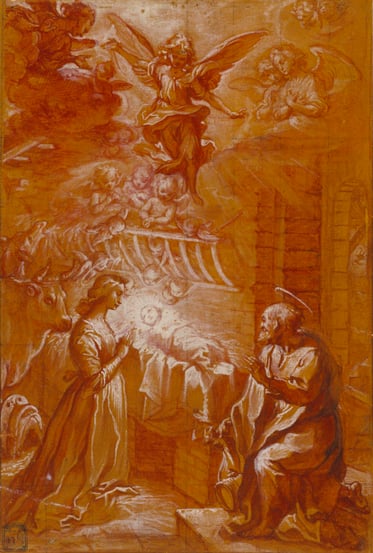Search for topics or resources
Enter your search below and hit enter or click the search icon.
December 23rd, 2013 | 6 min read

“On what were its footings set, or who laid its cornerstone—while all the morning stars sang together and all the angels shouted for joy?” — Job 38:6-7
The barrage of questions comes amidst the whirlwind to Job, a man from whom everything he loved had been taken. The answers are naturally implied: these are not real questions, but assaults on Job’s self-assuredness. “Where were you” in the moment of creation, when the word of God’s power fashioned the hidden recesses of the deep? The question itself is absurd: we could not yet be there, for we were not.

Francesco Vanni (Italian, 1563 – 1610).
The Nativity, about 1600, Red wash over black chalk, heightened with white gouache; on an ocher prepared ground, squared in black chalk
28.9 x 19.5 cm (11 3/8 x 7 11/16 in.)
The J. Paul Getty Museum, Los Angeles
But were you there for the start of the remaking, the restoration of all things? Were you sitting nearby in the cave, listening to the infant cry? Were you there, not when they crucified our Lord, but when he took his first human breaths? On that day, the morning stars sang once more together while the angel’s shouted for joy—for glad tidings of great joy, we might even say, which they announced to the rusticated rubes who had missed the “city” memo and were out tending their sheep in the sticks. Few came near to the one who had marked off the earth’s dimensions; it was an obscure beginning, and when the crowds eventually came they cheered his crucifixion. But to those who were called, the hope of a world that would once again know its maker burst forth in strains and shouts of gladness and joy.
The Word’s arrival was not from the whirlwind, as it was for Job. The peace on earth that his coming promised was met violently, for even at the beginning the nations refused to bear its cost. Herod slaughtered the innocents, but his ruthlessness was no more successful in its aims than Pilate’s dithering, fatal acquiescence. Both saw, though, that this was news of fundamental and cosmic importance. The joy of the Lord is to be met with either bended knee or defiant fist, for it is far stronger than we.
—
To what can we compare this moment? What aid can we bring that we might see as Herod and those shepherds saw? This is a reality costing “not less than everything,” as Eliot put it. We must either follow with all we have or expend ourselves in the vain efforts to make ourselves Lords of all. This is a moment that demands a choice: now is the day of salvation, now the judgment has come upon us. How shall we find such a fear that we might understand the council to “Fear not?”
The birth of Christ is a lily growing from the rubble of a war-torn England. It is the quiet happiness of a boy playing with his sister, while the parents rage nearby. It sounds as Nearer my God to Thee while panic grips the Titanic. It is Mozart’s Clarinet Concerto in Los Angeles’s rush hour traffic. It is the tremors of a man who kneels before his beloved, while her face turns to joy. It is the awe that descends upon us when we first cradle an innocent human life. It is the sweet moment of relief, the gracious recognition that all shall be well that is imparted to those gripped by the tearful agony of waiting for the gift of life. It is the moment of sorrow at the hour of two lovers’s death, the pain of loss that comes with the tearful laughter of funny memories and the knowledge that they shall not be parted long. It is the hour of quiet and contemplation broken by the happy shouts and teasing of a family.
We are no nearer to it than when we first began. This moment is a joy that not only vindicates all the world’s weeping, but prompts it as well. It is a joy that enlivens a weary world, a joy that carries its own strength and power, a joy so deep that all the horrors of the night fade in its light. It is right that a fallen world would answer this peace with violence: for it is a good beneath which our lives must come to an end, a judgment so true that we must forgo any further judgment. This is a “terrible good,” as Charles Williams put it, or if you prefer VanAuken a “severe mercy.” Those who see God in the flesh must either kill or give themselves over to death. For no one can see God and live.
Still, we are no closer. All those are vain attempts: they are only full of life and meaning if the Lord gives it to them. The Word has been made flesh, but we have not—nor will we ever—get beyond our stammering.
——
We have our own slaughter of the innocents in America. (Shall we name it something different? Shall we shrink from the horror, even with its many and complex causes?) The rulers and principalities of this world are no more favorable to the Word of life than they were on the day of his appearing. This too the Christmas story reminds us of—the darkness of death still wages war against the kingdom of light. The loud cry is still heard from Ramah; Rachel still weeps for her children. But yet the Savior cries out, Comfort ye, comfort ye my people.
But have we really caught the meaning? Have we trembled before the sacredness of a human life the Christ himself would enter into? Have we felt the terror of judgment, so that our “Judge not” is announced in power? Have we seen and touched the frailty of human life and been unmoved? Have we ourselves seen the great light? Have we tasted of the life that is life indeed, a life of sacrifice and sorrow and giving? We are all beneath the judgment: it is our sorrow and stain that is on the earth, our sin which stands in need of redemption. It is our hostility that will be unmasked at the cross. “His own received him not.” Nor do we still.
This too is the joy of the incarnation, though it is entangled with weeping and repentance. They are not so different, really, the joy and the sorrow. Within both lie the awe at a harsh and demanding goodness who asks of us repentance and gives us life in return.
———
It is in the rejoicing that the weary world gains its strength. We toil and struggle and sometimes grow feint. But the encounter with this child fills our lives an world with a meaning not of our own making, a meaning that makes us, a meaning that gives life.
And so in the face of suffering and shortcoming and sadness, we are exhorted to eat, drink, and be merry. Tomorrow we may die, yes. So? The King has come to his people: the restoration of the Kingdom has begun and the reign of death has been upended. It is all over save for the shouting, as they say, while the nations deludingly cling to their power. The Lord still sits in the heavens and laughs them to scorn. The foundations of the earth are his; what harm can touch us if we worship the one who established his strength out of the mouth of the infant?
Take heart, then, and be of good cheer. For the Savior has been born to us, and the voice of the angels and the song of the morning stars has not yet found its end.
Matthew Lee Anderson is an Associate Professor of Ethics and Theology in Baylor University's Honors College. He has a D.Phil. in Christian Ethics from Oxford University, and is a Perpetual Member of Biola University's Torrey Honors College. In 2005, he founded Mere Orthodoxy.
Topics: